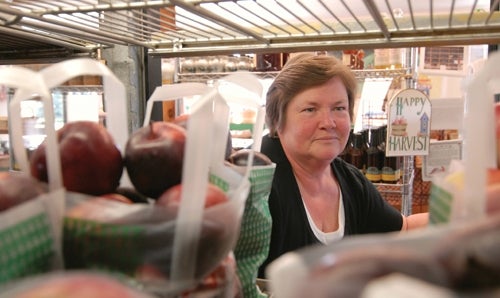It’s said that New Englanders are set in their ways. For the Carlson family, the largest producer of apple cider in the New England, that was especially true.
Carlson Orchards in Harvard has been in the family for two generations, so there’s been plenty of time for habits to set in.
But the Carlson family is not sitting idly by. Instead, they’re embracing new technology to help make their business more efficienct, and perhaps even help out the planet along the way.
Frank Carlson and his brothers Robert and Bruce only recently began looking at how the farm could save money on energy. The answer, they discovered, is in alternative energy sources.
The orchard is planning on installing a 1,050-panel solar power system near its front entrance, and in order to get the grants it needed to make the system a reality, the Carlsons were required to make some changes.
“We’ve done a lot of energy research and analysis of what we’re using here for energy,” Frank Carlson said. “We changed compressors, we changed the majority of the light bulbs in the whole farm, and we just got back an energy audit on oil consumption. The old oil burners run, but they probably aren’t burning oil properly.”
Those are things Carlson probably wouldn’t have done if the orchard weren’t prompted to by the U.S. Department of Agriculture as part of the $287,000 grant it’s providing the farm to put in the solar power system.
The farm also received a grant of about $542,000 from the Massachusetts Technology Collaborative.
Without the grants, the project wouldn’t be happening at all, according to Carlson. It simply wouldn’t be affordable.
The farm’s installment is expected to costs just over $1 million. Carlson said it’ll be up and running by the end of July.
When that day comes, the 220-kilowatt system will provide the 125-acre farm with between 75 and 80 percent of its electricity.
Carlson said the farm uses about 400,000 kilowatts annually, most of which is sucked up by refrigeration systems that cool six cold storage rooms, among other equipment.
Gary Keough, director of the USDA’s New England field office in Concord, N.H., said farms as old as Carlson’s became less and less energy efficient as they made greater and greater demands on public utility systems.
That’s because they’ve probably gone from heating with wood to heating with petroleum products. And in an industry where the margins are as thin as they are in farming, those old oil burners are almost more wasteful than they are useful.
The easiest applications for electricity generation for farms are wind turbines and solar panels, Keough said.
Farms in Massachusetts spent $16.6 million on utilities in 2007, according to the USDA’s latest census of agriculture, and what’s true for Carlson bears out for the rest of the industry: Electricity takes up the largest share and accounts for 3.6 percent of all farm expenditures.
And among farms, orchards are some of the heaviest users, Keough said.
“The amount of mechanisms, the mechanical nature of farming today, they’re putting a lot of production on a small footprint, especially orchards and dairy operations” that are required to keep large volumes of product cold, he said.
But there are other reasons for farms like Carlson’s to undertake large-scale energy efficiency projects.
Carlson’s solar panels will be mounted on the ground right at the front of the farm.
“They’ll be very visible. It’s a good marketing tool,” Carlson said.

